
The BBC has lacked balance in this area. The BBC covered an article specifically about Muslim women receiving rape threats on the Clubhouse app in India. It also gave coverage on an app that was apparently there to put a small list of Indian Muslim women up for sale in what appeared to be an online trolling case.

INSIGHT UK’s research team found a plethora of vulgar links in India set up on Telegram, Reddit and other websites insulting Hindu women.
Some carried grotesque images of Muslim men abusing Hindu women or using deep fake images to humiliate Hindu women. Some of these have since been taken down. An Indian journalist received similar messages. Nothing was found on the BBC covering this.
Not a single BBC article on Muslim grooming gangs in India could be found despite the well-documented harassment of Hindu women by Muslim males in India.
There are numerous reports available online where Muslim males have dismembered Hindu women and put them into suitcases and fridges or doused them in petrol. This is often for refusing to convert to Islam and cases exist where the Muslim male has hidden their identity and posed as a Hindu, sometimes to exploit what news sites described as “Dalit” women.
A more high-profile case was of Indian actress Tunisha Sharma. Sharma’s mother said there was pressure from her Muslim boyfriend for her to convert to Islam and that she was forced to do many things against her will.
The BBC did cover the same event but without those views from her family. Instead, they stated in their coverage that “love jihad angle – a term radical Hindu groups use to promote a baseless accusation that Muslim men are converting Hindu women by marriage”.
Whatever the term is (love jihad, grooming, or manipulation), to call it a “baseless accusation” is denial and effectively victim-shames Hindu women.
Cases of Hindu women who have come forward to describe their ordeal are widely documented. One Indian news site documented and referenced over 150 cases of what they call “love jihad”.
This way of silencing Hindu concerns is very similar to what the UK witnessed against white British girls in a nationwide grooming gang scandal, where men of largely Pakistani-Muslim heritage abused young vulnerable children. Few organisations would provide it with the coverage it deserved at the time.
The grooming sex abuse scandal is now well-reported in the UK. The narrative that only Muslim women are harassed and almost no reports on Hindu women, in a country with over 200 million Muslims, simply cannot be true.
Hindu men have also been lynched by Islamists for marrying Muslim women, and Muslim women harassed just for being seen with a Hindu boy.
In 2023, a WhatsApp vigilante group with hundreds of Muslim members was caught by Police in India. The group were harassing Muslim women who had chosen a Hindu partner. Such serious organised harassment of Hindus by Muslims is rarely covered on the BBC.
In another strange article of two Hindu girls being found hanged, five boys with Muslim names were arrested. The BBC felt it important to mention their caste and its relationship with Hinduism, something which didn’t factor into the crimes, but they did not mention the faith of the accused.
The killing, forced marriage, and conversion of Hindu women in Pakistan by Muslim males are also rarely covered. In 2022, Pooja Kumari was shot dead after she resisted abduction for alleged forced marriage and conversion. This was covered at a much smaller scale by the BBC compared to when alleged cases of harassment happened to Muslim women in India.
The BBC’s lack of reporting on Hindu issues gives a false narrative of what is actually happening in the Indian subcontinent.
The BBC did cover one article in 2019, running the headline Pakistan police investigate ‘joint suicide’ of sisters-in-law. Almost no mention of the word Hindu is made, until right at the end of the article where the reference is made that the region has low-caste Hindus and that they are looked down upon by some upper-caste Hindus and Muslims.
The reference appears to take away from the plight of Hindu girls in Pakistan and instead make it a caste issue, which there is no evidence of. In comparison, the same article in India was reported by Swarajya with a direct reference to them being Hindu in their headline, Two Hindu Sisters-In-Law Commit ‘Joint Suicide’ In Pakistan’s Poorest Thar Region, Police Begins Probe.
Another new story that receives low coverage is when Indian Muslim women are harassed by Islamists. These are hard-line Muslims who advocate fundamentalism and cannot accept that a Muslim woman respects or takes upon another faith.
BBC India does not present both sides of the story and seems unwilling to cover Muslim men abusing Muslim women openly online in India.
For example, Sara Ali Khan, daughter of Bollywood actor Saif Ali Khan, was mercilessly shamed and abused online for visiting Hindu holy sites. Comments on her posts suggest this is not what a Muslim woman is expected to do.
One Indian Muslim Television actress, Urfi Javed, stated “I am a Muslim girl. Most of the hate comments I receive are from Muslim people. They want to control all the women in the community”. Pakistani actresses too have been trolled by conservative Muslims.
Indian Muslim women have also been physically and verbally attacked by Islamists for their political views, for example, if they have supported the BJP or simply for being educated.
This trend appears to indicate that the BBC exhibits a lack of interest in exploring diverse perspectives unless a Hindu individual is implicated as the villain, as none of the aforementioned occurrences have been documented in their reporting.
The Guardian was the second most complained against media outlet in the INSIGHT UK survey. Two writers cover the 1971 Bangladesh war and how rape affected women in one article. The article completely evades the fact that the bulk of the rapes were committed by Muslim men against Hindu women. A key omission.
References for this article can be found in the full report.
Download full report








